
NGC 4489 is a dwarf elliptical galaxy located about 60 million light-years away in the constellation of Coma Berenices. It was discovered by astronomer William Herschel on March 21, 1784. NGC 4489 is a member of the Virgo Cluster.

NGC 4488 is a lenticular galaxy located about 60 million light-years away in the constellation of Virgo. The galaxy was discovered by astronomer William Herschel on December 28, 1785. NGC 4488 is a member of the Virgo Cluster.

NGC 4483 is a barred lenticular galaxy located about 55 million light-years away in the constellation of Virgo. NGC 4483 was discovered by astronomer Heinrich d'Arrest on March 19, 1865. NGC 4483 is a member of the Virgo Cluster.
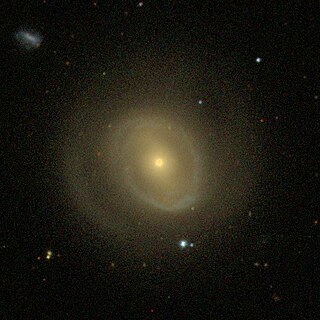
NGC 4454 is a barred spiral galaxy located about 123 million light-years away in the constellation of Virgo. NGC 4454 was discovered by astronomer William Herschel on April 17, 1784.

NGC 4464 is an elliptical galaxy located about 70 million light-years away in the constellation of Virgo. NGC 4464 was discovered by astronomer William Herschel on December 28, 1785. NGC 4464 is a member of the Virgo Cluster.

NGC 4466 is an edge-on spiral galaxy located about 50 million light-years away in the constellation of Virgo. NGC 4466 was discovered by astronomer Bindon Stoney on February 26, 1851. The galaxy is a member of the Virgo Cluster.
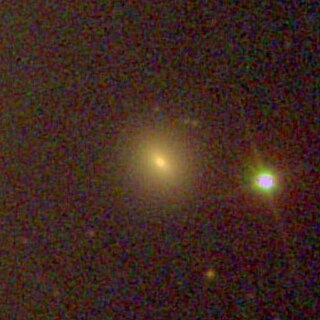
NGC 4467 is an elliptical galaxy located about 78 million light-years away in the constellation of Virgo. NGC 4467 was discovered by astronomer Otto Struve on April 28, 1851. NGC 4467 is a companion of Messier 49 and is a member of the Virgo Cluster.

NGC 4620 is a lenticular galaxy located about 65 million light-years away in the constellation of Virgo. It was discovered by astronomer John Herschel on March 29, 1830. NGC 4620 is a member of the Virgo Cluster.
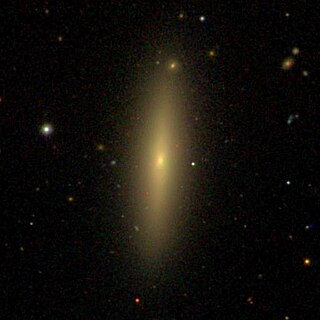
NGC 4623 is an edge-on lenticular or elliptical galaxy located about 54 million light-years away in the constellation of Virgo. NGC 4623 is classified as an E7, a rare type of "late" elliptical that represents the first stage of transition into a lenticular galaxy. NGC 4623 was discovered by astronomer William Herschel on April 13, 1784. NGC 4623 is a member of the Virgo Cluster.

NGC 4612 is a barred lenticular galaxy located about 57 million light-years away in the constellation of Virgo. NGC 4612 was discovered by astronomer William Herschel on January 23, 1784. The galaxy is a member of the Virgo Cluster.

NGC 4633 is a spiral galaxy located about 70 million light-years away in the constellation of Coma Berenices. It is interacting with the nearby galaxy NGC 4634. NGC 4633 was discovered by astronomer Edward D. Swift on April 27, 1887. It was rediscovered on November 23, 1900, by astronomer Arnold Schwassmann and was later listed as IC 3688. NGC 4633 is a member of the Virgo Cluster.

NGC 4754 is a barred lenticular galaxy located about 53 million light-years away in the constellation of Virgo. NGC 4754 was discovered by astronomer William Herschel on March 15, 1784. It forms a non-interacting pair with the edge-on lenticular galaxy NGC 4762. NGC 4754 is a member of the Virgo Cluster.

NGC 4606 is a spiral galaxy located about 55 million light-years away in the constellation of Virgo. NGC 4606 was discovered by astronomer William Herschel on March 15, 1784. It has a disturbed stellar disk suggesting the actions of gravitational interactions. NGC 4607 may be a possible companion of NGC 4606. However, their redshifts differ by about 600 km/s, making it unlikely that they are a gravitationally bound pair. NGC 4606 is a member of the Virgo Cluster.
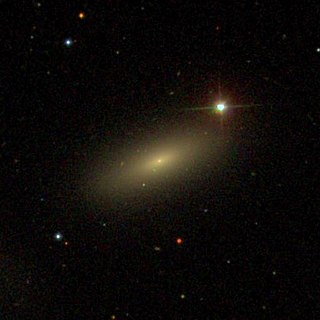
NGC 4436 is a lenticular or dwarf elliptical galaxy located about 60 million light-years away in the constellation of Virgo. NGC 4436 was discovered by astronomer William Herschel on April 17, 1784. The galaxy is a member of the Virgo Cluster.

NGC 4474 is an edge-on lenticular galaxy located about 50 million light-years away in the constellation Coma Berenices. NGC 4474 was discovered by astronomer William Herschel on April 8, 1784. It is a member of the Virgo Cluster.

NGC 4482 is a dwarf elliptical galaxy located about 60 million light-years away in the constellation Virgo. NGC 4482 was discovered by astronomer William Herschel on March 15, 1784. It was rediscovered by astronomer Arnold Schwassmann on September 6, 1900 and was listed as IC 3427. It is a member of the Virgo Cluster.
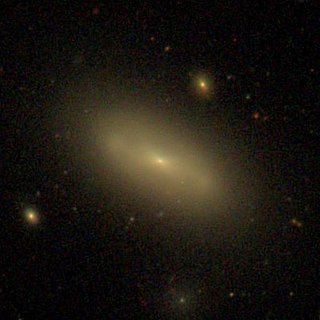
NGC 4497 is a lenticular galaxy located about 60 million light-years away in the constellation Virgo. NGC 4497 was discovered by astronomer William Herschel on March 15, 1784. It was rediscovered by astronomer Arnold Schwassmann on November 8, 1900 and was listed as IC 3452. NGC 4497 is a member of the Virgo Cluster.

NGC 4498 is a barred spiral galaxy located about 50 million light-years away in the constellation Coma Berenices. NGC 4498 was discovered by astronomer William Herschel on March 21, 1784. NGC 4498 is a member of the Virgo Cluster.

NGC 4503 is a barred lenticular galaxy located around 41 to 74 million light-years away in the constellation Virgo. NGC 4503 was discovered by astronomer William Herschel on March 15, 1784. NGC 4503 is a member of the Virgo Cluster.
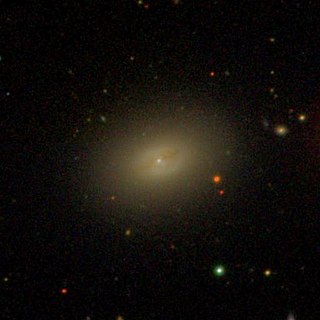
NGC 4506 is a spiral galaxy located around 50 million light-years away in the constellation Coma Berenices. It is classified as peculiar due to the presence of dust that surrounds its nucleus. NGC 4506 was discovered by astronomer William Herschel on January 14, 1787. It is a member of the Virgo Cluster.




















